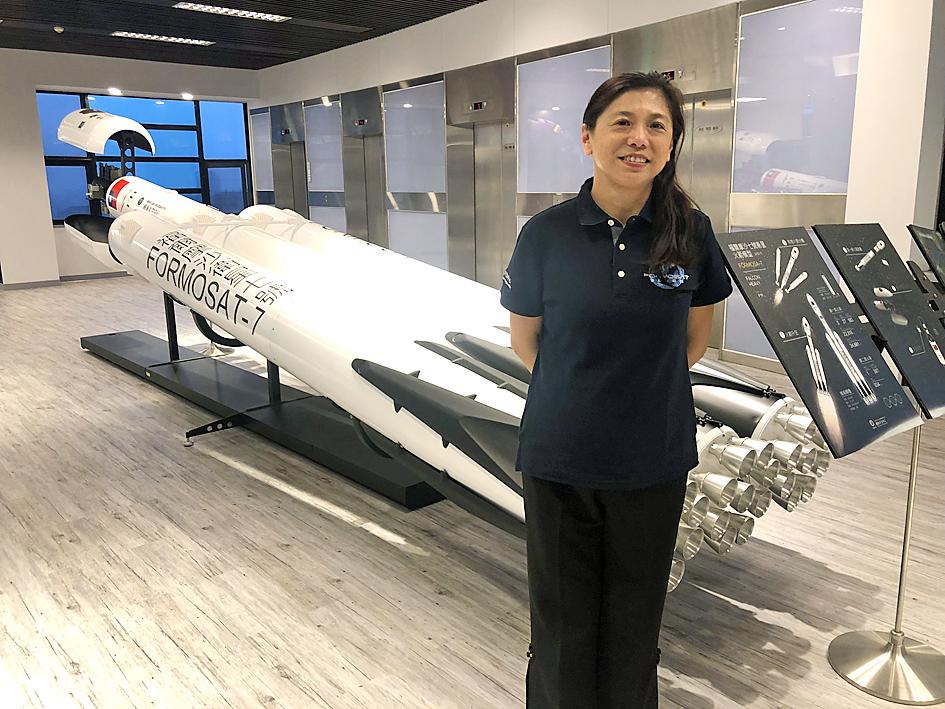All six of Taiwan’s Formosat-7/COSMIC-2 satellites, which were launched to improve weather forecasting, have reached their mission orbits, the Ministry of Science and Technology said in a statement yesterday.
The satellites, launched by Space Exploration Technologies Corp (SpaceX) to an orbit 720km from Earth in June 2019, have been gradually moved to their designated mission orbits of 540km to 550km over the past 18 months, the statement said, adding that the process was completed on Wednesday last week.
The project is a joint operation between the National Space Organization and the US’ National Oceanic and Atmospheric Administration (NOAA) to improve weather data collection in the tropics, the ministry said.

Photo: CNA
By moving into their mission orbits, the satellites can better cover the area 50 degrees north and south of the equator and make up for a lack of weather data there.
Data collected by the constellation of six satellites were first made available on a trial basis in December 2019, before being made public on March 7 last year, the ministry said, adding that the data have already helped improve the accuracy of weather forecasts by 10 to 11 percent.
According to the National Space Organization, the satellite constellation can “receive GPS signals from the United States and [Global Navigation Satellite System] signals from Russia,” and “by measuring radio occultation signals, atmospheric parameters such as humidity and the electron concentration of the ionosphere can be derived.”
It can collect 4,000 pieces of data per day, the ministry said.
This means forecasters can use the information to better predict the formation of typhoons and their movements, it said.
In addition to the Central Weather Bureau, and research teams at National Central University and National Cheng Kung University, research bodies under the NOAA and the University Corporation for Atmospheric Research, as well as meteorological organizations around the world are using data collected by Formosat-7, the ministry said.

CHAOS: Iranians took to the streets playing celebratory music after reports of Khamenei’s death on Saturday, while mourners also gathered in Tehran yesterday Iranian Supreme Leader Ayatollah Ali Khamenei was killed in a major attack on Iran launched by Israel and the US, throwing the future of the Islamic republic into doubt and raising the risk of regional instability. Iranian state television and the state-run IRNA news agency announced the 86-year-old’s death early yesterday. US President Donald Trump said it gave Iranians their “greatest chance” to “take back” their country. The announcements came after a joint US and Israeli aerial bombardment that targeted Iranian military and governmental sites. Trump said the “heavy and pinpoint bombing” would continue through the week or as long

TRUST: The KMT said it respected the US’ timing and considerations, and hoped it would continue to honor its commitments to helping Taiwan bolster its defenses and deterrence US President Donald Trump is delaying a multibillion-dollar arms sale to Taiwan to ensure his visit to Beijing is successful, a New York Times report said. The weapons sales package has stalled in the US Department of State, the report said, citing US officials it did not identify. The White House has told agencies not to push forward ahead of Trump’s meeting with Chinese President Xi Jinping (習近平), it said. The two last month held a phone call to discuss trade and geopolitical flashpoints ahead of the summit. Xi raised the Taiwan issue and urged the US to handle arms sales to

A magnitude 5.6 earthquake struck off the coast of Yilan County at 12:37pm today, with clear shaking felt across much of northern Taiwan. There were no immediate reports of damage. The epicenter of the quake was 16.9km east-southeast of Yilan County Hall offshore at a depth of 66.8km, Central Weather Administration (CWA) data showed. The maximum intensity registered at a 4 in Yilan County’s Nanao Township (南澳) on Taiwan’s seven-tier scale. Other parts of Yilan, as well as certain areas of Hualien County, Taipei, New Taipei City, Taoyuan, Hsinchu County, Taichung and Miaoli County, recorded intensities of 3. Residents of Yilan County and Taipei received

Taiwan has secured another breakthrough in fruit exports, with jujubes, dragon fruit and lychees approved for shipment to the EU, the Ministry of Agriculture said yesterday. The Animal and Plant Health Inspection Agency on Thursday received formal notification of the approval from the EU, the ministry said, adding that the decision was expected to expand Taiwanese fruit producers’ access to high-end European markets. Taiwan exported 126 tonnes of lychees last year, valued at US$1.48 million, with Japan accounting for 102 tonnes. Other export destinations included New Zealand, Hong Kong, the US and Australia, ministry data showed. Jujube exports totaled 103 tonnes, valued at